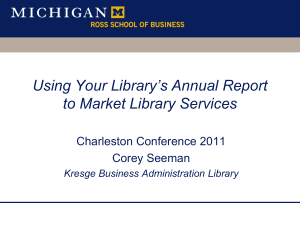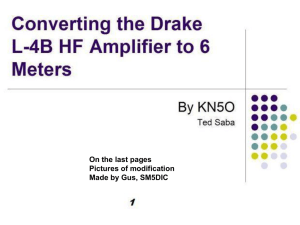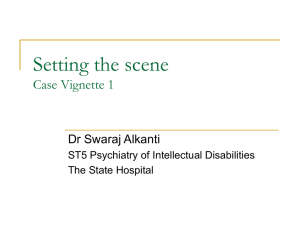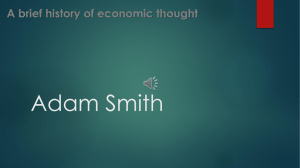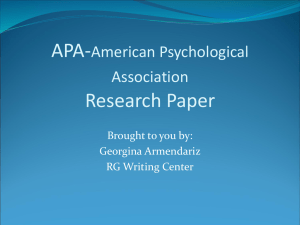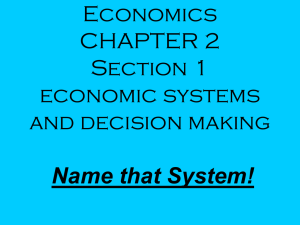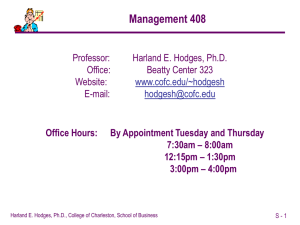Eat Yourself Full, Leave Your Plate Empty - Deep Blue
advertisement
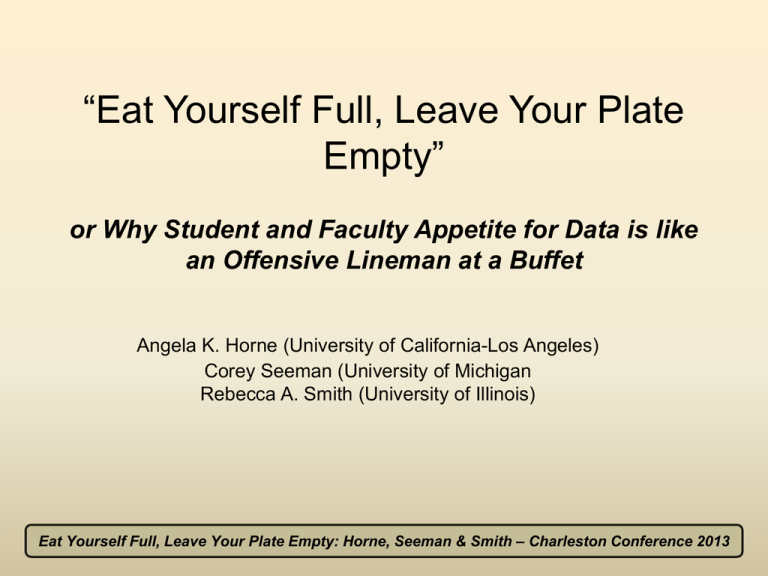
“Eat Yourself Full, Leave Your Plate Empty” or Why Student and Faculty Appetite for Data is like an Offensive Lineman at a Buffet Angela K. Horne (University of California-Los Angeles) Corey Seeman (University of Michigan Rebecca A. Smith (University of Illinois) Eat Yourself Full, Leave Your Plate Empty: Horne, Seeman & Smith – Charleston Conference 2013 Why Offensive Linemen? They are BIG They eat a lot They would pay the same for a buffet...than well, everyone else! Eat Yourself Full, Leave Your Plate Empty: Horne, Seeman & Smith – Charleston Conference 2013 Lively Lunch? Why the Buffet? Eat Yourself Full, Leave Your Plate Empty: Horne, Seeman & Smith – Charleston Conference 2013 One vs. Many • The Print Library is about need – The burden of work associated with each acquisition by users curtailed use • The Electronic Library is about access – The burden of work associated with each acquisition by users is relatively non-existent – so there is no restraint on heavy use. Eat Yourself Full, Leave Your Plate Empty: Horne, Seeman & Smith – Charleston Conference 2013 Presentation Outline 1. Buffet Pricing and Consumption 2. Business Research and Audiences at the three schools 3. Issues with Libraries and Vendors 4. Solutions, Ideas & Recommendations Eat Yourself Full, Leave Your Plate Empty: Horne, Seeman & Smith – Charleston Conference 2013 Buffet Pricing and Consumption Miller’s Smorgasbord (Lancaster, PA) Eat Yourself Full, Leave Your Plate Empty: Horne, Seeman & Smith – Charleston Conference 2013 Buffet Pricing and Consumption • • Work of Brian Wansink (Cornell University) – Consumer Behavior and Applied Economics Observation of customers at all-you-can eat Chinese Buffets Eat Yourself Full, Leave Your Plate Empty: Horne, Seeman & Smith – Charleston Conference 2013 Buffet Pricing and Consumption • Compared the BMI estimate and the behaviors at the restaurant – Driving factors include: • Size of the plate used (large vs. small) • Facing the buffet or facing away • Sat at a table or sat at a booth • Use of chopsticks or fork • Browse buffet first or serve immediately Eat Yourself Full, Leave Your Plate Empty: Horne, Seeman & Smith – Charleston Conference 2013 Buffet Pricing and Consumption • • • • None of Wansink’s studies dwell on the quality or taste of the food. He is measuring the eating activities of people who, fundamentally, have no constraint placed on them. Does recognize that people are more likely to try items – or leave items that they do not like. Observed leftovers on plates ranged from 6% to 10% of food content. Eat Yourself Full, Leave Your Plate Empty: Horne, Seeman & Smith – Charleston Conference 2013 Buffet Pricing and Consumption • • • • How might these studies might apply to library usage and downloading behavior? Students (and faculty) will download far more than they will use - and potentially read. Usage counts are driven every time we download a document - many, many are not fully digested With Groceries, we do not simply buy just what we need - but buy in the quantities that are available. Eat Yourself Full, Leave Your Plate Empty: Horne, Seeman & Smith – Charleston Conference 2013 Buffet Pricing and Consumption • This is what we are being sold.... Eat Yourself Full, Leave Your Plate Empty: Horne, Seeman & Smith – Charleston Conference 2013 Business Research and Audiences at the three schools • Overall - what is business research and how is it being done? • Examples from UCLA, Michigan and Illinois • All three libraries have members in the ABLD (Academic Business Library Directors) • The ABLD represents 50 of the top academic business libraries in North America. Eat Yourself Full, Leave Your Plate Empty: Horne, Seeman & Smith – Charleston Conference 2013 Business Research and Audiences at the three schools University of California-Los Angeles • Multiple funding streams (Anderson School of Management, UCLA Library) • Differing budget models • Ceased active monograph purchasing • “Today’s Special” – one-time monograph funds • Others on campus want our resources • Field study projects • State funding decrease…70% (1970s) to <10% (2013). Move to self-sustaining. Eat Yourself Full, Leave Your Plate Empty: Horne, Seeman & Smith – Charleston Conference 2013 Business Research and Audiences at the three schools University of California-Los Angeles • Different MBA programs – – – – • • • • • FT (750) FEMBA, including Flex (850) EMBA (500) GEMBA (two programs) MFE (100) PhD (80) Undergraduate Accounting Minors (200) Faculty (including lecturers and adjuncts) – 140 Note: The Rosenfeld Library supports business research across UCLA. Eat Yourself Full, Leave Your Plate Empty: Horne, Seeman & Smith – Charleston Conference 2013 Business Research and Audiences at the three schools University of California-Los Angeles • Sample UCLA Research Topics – – – Rental rates by zip code Regional sports data (ad spend, stadium concession sales) Stock data for all companies across multiple exchanges Eat Yourself Full, Leave Your Plate Empty: Horne, Seeman & Smith – Charleston Conference 2013 Business Research and Audiences at the three schools • University of Michigan (Ross School of Business) • Funding of library purchases (Ross School of Business) • Essentially Flat funding last five years – but decreases in materials. • This year, large cuts in periodicals and standing orders this year. • Kresge supports business research for departments outside Ross Eat Yourself Full, Leave Your Plate Empty: Horne, Seeman & Smith – Charleston Conference 2013 Business Research and Audiences at the three schools University of Michigan (Ross School of Business) • Population served (Fall 2013) • Full-Time MBA - 941 • Part-Time MBA - 315 • Weekend MBA – 164 • Global MBA - 38 • Exec MBA - 196 • Other Masters - 124 • BBA – 1422 • Undergrad Minor - 100 • PhD - 95 • Faculty - 210 Eat Yourself Full, Leave Your Plate Empty: Horne, Seeman & Smith – Charleston Conference 2013 Business Research and Audiences at the three schools University of Michigan research topics include: • Assessment of all companies in a field (financial performance) • Analysis of corporate press releases & news articles on a particular topic or trend • Determination of Market Sizes, especially in growing and developing industries (historical) • When the job market improves, reference demands decrease (and vice versa) Eat Yourself Full, Leave Your Plate Empty: Horne, Seeman & Smith – Charleston Conference 2013 Business Research and Audiences at the three schools University of Illinois • Funds for database is collaborative; some are interdisciplinary and paid by the ER fund; some for business library budget (University Library subject funds); most financial datasets are paid by business school but business librarians provide research support in their use Eat Yourself Full, Leave Your Plate Empty: Horne, Seeman & Smith – Charleston Conference 2013 Business Research and Audiences at the three schools COLLEGE of BUSINESS • • • • • • • Undergraduates 2974 Master's Programs 712 MBA 296 Exe MBA 56 PHD 100 Faculty 109 (FTE Tenure-Track) Faculty – 90 other (visiting, post doc, adjuncts, lecturers) Eat Yourself Full, Leave Your Plate Empty: Horne, Seeman & Smith – Charleston Conference 2013 Business Research and Audiences at the three schools CAMPUS & the State • • • 43,000 Campus Cross-disciplinary experiential learning groups, affinities with law, engineering, computer science, economics, political science Research park for technology transfer Eat Yourself Full, Leave Your Plate Empty: Horne, Seeman & Smith – Charleston Conference 2013 Business Research and Audiences at the three schools • Faculty/PhD Researchers – In academic business research, faculty and ph.d’s want full access and more than what the buffet allows for each meal now that so many external drives can hold more memory – They will sort out what they don’t want later and/or add to what they’ve already downloaded for perceived time savings – Some will distill using tools such as STATA, SPSS, SAS, or BibTex, Invivo Eat Yourself Full, Leave Your Plate Empty: Horne, Seeman & Smith – Charleston Conference 2013 Business Research and Audiences at the three schools • Undergraduates, Walk-ins – Turn to Google first, hoping the information needed is freely available, spend lots of time that in sum is more than they anticipated – Locate datasets or market research reports which aren’t free, then ask the library (via a chat service or e-mail sometimes in person) if the library owns the material – The other scenario is that the student may be aware of market research reports and through topics or keyword, they find reports, download more reports than necessary, then sift through the reports for the 2 pages of data/text to support their research Eat Yourself Full, Leave Your Plate Empty: Horne, Seeman & Smith – Charleston Conference 2013 Business Research and Audiences at the three schools • Types of Research ● Company performance ● Strategy -buying/selling/partnerships with other companies, exploring new markets, hiring of personnel, new product development ● Leadership and organizational structure ● Accounting decisions/behavior The Buffet (Data Sources Used) WRDS-Wharton Research Data System offers lots of financial and company information, downloadable in large files in just about any format desired, and almost unlimited; it is a front-end to many types of datasets Thomson’s Securities Data Corp (SDC), lots of downloading of mergers, securities, consumer items purchases Article databases Market Research reports Press releases Parsing of Security Exchange Commission (SEC) filings and company annual reports for addresses, changes in leadership, plant locations Other private company information that is not easy to obtain other than searching news or articles Eat Yourself Full, Leave Your Plate Empty: Horne, Seeman & Smith – Charleston Conference 2013 Business Research and Audiences at the three schools • So what is going on at your institution? • What types of limits are your students and faculty running into? • What data are they asking for that you can (or cannot) provide? • “Appetite Driven” Research Needs Eat Yourself Full, Leave Your Plate Empty: Horne, Seeman & Smith – Charleston Conference 2013 Issues with Libraries and Vendors • Harvard Business Review & EBSCO access (Business Source) • Financial Times & 30 Day Embargo • Data mining and Factiva • PrivCo Access and Usage Problems • Problematic audiences • Perceptions of misuse by community members Eat Yourself Full, Leave Your Plate Empty: Horne, Seeman & Smith – Charleston Conference 2013 Issues with Libraries and Vendors • • • • • Harvard Business Review & EBSCO access (Business Source) Harvard Business Review is available through Business Source Complete from 1922 to the present in full-text format. Use in the classroom was never implied in this access – but only for personal research use. Any classroom use required payment of rights through Harvard Business Publishing. Summer of 2013 – HBR now has a view only approach for the top 500 articles to ensure that schools pay for rights. Eat Yourself Full, Leave Your Plate Empty: Horne, Seeman & Smith – Charleston Conference 2013 Issues with Libraries and Vendors • Only solution for Harvard access is to get full download access is to acquire their Enterprise License. • Kresge (Michigan) has this because we manage the Ross coursepack operations. • Cost for the Enterprise License is driven by the number of expected uses in course materials during the year. • This is more of a curricular than research item. • Future of HBR on EBSCO Platform Eat Yourself Full, Leave Your Plate Empty: Horne, Seeman & Smith – Charleston Conference 2013 Issues with Libraries and Vendors • Financial Times this summer introduced a 30 day embargo for all content in aggregators • ABI/INFORM (ProQuest) • LexisNexis Academic • Access World News • Factiva • Simultaneously, they introduced a new campus access program which will provide access to the most recent 30 days, plus some additional content. Eat Yourself Full, Leave Your Plate Empty: Horne, Seeman & Smith – Charleston Conference 2013 Issues with Libraries and Vendors • There is an ABLD offer for reduced content (primarily during first year) – 10 of the 45 schools have gone this route. • We are watching for possible others following this path – such as the New York Times as they are launching a similar service for libraries. Eat Yourself Full, Leave Your Plate Empty: Horne, Seeman & Smith – Charleston Conference 2013 Issues with Libraries and Vendors • • Factiva & Data-mining (Michigan) Excessive use from a student was considered to be a data-mining exercise – which is against the standard contract • We are prohibited from reproducing and redistributing • Removing any copyright notices • “Use of Information or the attached codes to fed any data mining software or other automated trend analysis application” • IP trail does not work because these typically report the proxy location Eat Yourself Full, Leave Your Plate Empty: Horne, Seeman & Smith – Charleston Conference 2013 Issues with Libraries and Vendors • Factiva was expecting the usage spike to stop • We knew who was doing to research because of questions they asked – so we were able to get them to scale back. • During our “breech” – Factiva set a limit of 1 download of an article at a time (as opposed to 100) – the smallest plate possible • We would need to purchase a ‘text mining license’ • Subsequent researcher just focused on using boolean searches and counting results – no spike because no downloads. Eat Yourself Full, Leave Your Plate Empty: Horne, Seeman & Smith – Charleston Conference 2013 Issues with Libraries and Vendors • PrivCo issues at Illinois • PrivCo has quotas on downloading, but they didn’t explain that in the license agreement • It’s not known when the quota limit hits, but it is known that the download limit is about 900 lines at a time in Excel format • In mid-April, Illinois received an e-mail from a sales rep that they were concerned about too much downloading and they were cutting off access for two weeks until they could supply a more workable situation (this also happened at another ABLD library) Eat Yourself Full, Leave Your Plate Empty: Horne, Seeman & Smith – Charleston Conference 2013 Issues with Libraries and Vendors • Illinois pushed back because of timing in the semester (3 weeks until finals) and that students should not be penalized for accessing the database when papers/projects were due • Compromise was PrivCo would mediate search of companies and their profiles and send them to the students (this had been done previously for phD/faculty) who requested them • Access was turned back on within 2 days • Quota issue is still unresolved • Usage statistics indicate only 5% were exported, which are due to restrictions/mediated searches • This is one model that is OK for PhD and students who are comfortable with the arrangement as long as the data is delivered within a few days, but not sustainable for undergrads or MBA students want a few companies’ data tomorrow for project analysis Eat Yourself Full, Leave Your Plate Empty: Horne, Seeman & Smith – Charleston Conference 2013 Issues with Libraries and Vendors • Problematic audiences • Alumni access • ExecMBA • Part-time MBA • Walk-in users • Academic customers pay ‘pennies on the dollar’ for most business content vs. What commercial customers pay. • The fact that ExecMBA and Part-time MBA students have this commercial life concerns many (Capital IQ) Eat Yourself Full, Leave Your Plate Empty: Horne, Seeman & Smith – Charleston Conference 2013 Issues with Libraries and Vendors • Perceptions of mis-use • UCLA loses access to Passport GMID (Euromonitor) because of perceived misuse Eat Yourself Full, Leave Your Plate Empty: Horne, Seeman & Smith – Charleston Conference 2013 Solution, Ideas & Recommendations From the website Ron Swanson Says.... http://ronsays.tumblr.com/ Eat Yourself Full, Leave Your Plate Empty: Horne, Seeman & Smith – Charleston Conference 2013 Solution, Ideas & Recommendations • The problems with life at “the knot” • Libraries and Publishers work out arrangements – but neither are always the users or content creators. Eat Yourself Full, Leave Your Plate Empty: Horne, Seeman & Smith – Charleston Conference 2013 Solution, Ideas & Recommendations • Licensing issues to protect the publisher and the user (library). • ABLD libraries are particularly aware of the need to balance between the needs of the users and the needs of the vendor. • These issues are fairly unique to business. Eat Yourself Full, Leave Your Plate Empty: Horne, Seeman & Smith – Charleston Conference 2013 Solution, Ideas & Recommendations • With business resources, there are two distinct pricing models for the academic and commercial marketplaces. • Academic customers pay pennies on the dollar in large part to get in front of their future customers. Eat Yourself Full, Leave Your Plate Empty: Horne, Seeman & Smith – Charleston Conference 2013 Solution, Ideas & Recommendations • There is a role for mediated searching by librarians on behalf of students. • Many vendors are nervous about offering access to the end user – but are OK with a mediated approach. Eat Yourself Full, Leave Your Plate Empty: Horne, Seeman & Smith – Charleston Conference 2013 Solution, Ideas & Recommendations • With Frost.com, the generic login (used by students) does not allow downloads of reports. However, they are told to contact a librarian with the report information and the librarians can download it for the students. • This provides the students with the report AND the company with the security they desire. • Gives publishers the “breaks” on runaway usage (a real threat for them). • Not a ton of work for the librarians. Eat Yourself Full, Leave Your Plate Empty: Horne, Seeman & Smith – Charleston Conference 2013 Solution, Ideas & Recommendations • More data options for downloading. • Students & faculty want to download large batches of company records for analysis – many resources have smaller caps (25 or 50 up to 5000) that do not work for all projects. Eat Yourself Full, Leave Your Plate Empty: Horne, Seeman & Smith – Charleston Conference 2013 Solution, Ideas & Recommendations • BVD sold Michigan a snapshot of their Orbis data at the end of the last few years so students can play with it a great deal – without limits. • The cost was modest and we were able to get the student the data they needed without taxing their web system. Eat Yourself Full, Leave Your Plate Empty: Horne, Seeman & Smith – Charleston Conference 2013 Solution, Ideas & Recommendations • Kohl’s pricing and insane ROI • Usage data and the reality of the “list price” • There is no deterrent to download a full document – so they do! • Probably 1 in 4 downloads gets fully used – maybe less. Eat Yourself Full, Leave Your Plate Empty: Horne, Seeman & Smith – Charleston Conference 2013 Solution, Ideas & Recommendations • • • • • Limiting downloading capacities for academic customers in textual products. Similar to issues with ebook downloads. Many provide in full PDFs - some vendors (GBI, eTrack, Mintel) make it difficult for students to download full reports. While this “protects” their product, it makes users less enthusiastic about going to the resource. Leave it to students to find “work-arounds” Eat Yourself Full, Leave Your Plate Empty: Horne, Seeman & Smith – Charleston Conference 2013 Solution, Ideas & Recommendations • Managing narrow needs of the users. • Why subscribe when the data request is narrow and limited? Eat Yourself Full, Leave Your Plate Empty: Horne, Seeman & Smith – Charleston Conference 2013 Solution, Ideas & Recommendations • Too often, the data requests stem from individual research requests – not longstanding research needs. • Reality is that we rent a car when we travel – we do not BUY one. • Ideally, vendors can see this as an accidental revenue stream – not a pipeline. • The business academic community should be seen as a pathway to the commercial business community. Eat Yourself Full, Leave Your Plate Empty: Horne, Seeman & Smith – Charleston Conference 2013 Issues with Libraries and Vendors • What our Researchers Want – The PhD’s want static data offered through the front end of the WRDS system, but WRDS doesn’t do everything, particularly with directory type information (addresses, executives, plant locations) – A return of DVD/CD format would be fine as long as it could be accessed via VPN; ideally it would be over the web, but may stress the vendor’s server – Many historical directories are being digitized but in PDF, that means searching one company record at a time--not acceptable to researchers who are researching 500 to 5000 companies for sample size expected in business research Eat Yourself Full, Leave Your Plate Empty: Horne, Seeman & Smith – Charleston Conference 2013 4 9 Issues with Libraries and Vendors Bessinger's BBQ & Buffet, Charleston, SC Eat Yourself Full, Leave Your Plate Empty: Horne, Seeman & Smith – Charleston Conference 2013 5 0 Solution, Ideas & Recommendations • Budgetary Issues at Business Libraries. • Many schools are focused on stretching dollars by cutting redundant information sources. • Great deal of redundancy in resources that provide company/industry information. • Which ones provide the best usability and downloading capability? Eat Yourself Full, Leave Your Plate Empty: Horne, Seeman & Smith – Charleston Conference 2013 Thank You Angela K. Horne (UCLA) ahorne@library.ucla.edu Corey Seeman (Michigan) cseeman@umich.edu Rebecca A. Smith (Illinois) becky@illinois.edu Eat Yourself Full, Leave Your Plate Empty: Horne, Seeman & Smith – Charleston Conference 2013

